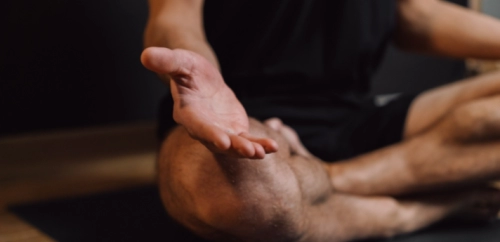Why Does Meditation Focus On Breathing?

“Breathing is the connecting link between the conscious and the subconscious, between body and mind. In fact, the ability to control our body and mind, and to change our lives, our karma, depends upon this breathing” – Taisen Deshimaru.
No matter how familiar you are with meditation, one thing is for sure, we all have an image of someone sitting cross-legged with their hands on their knees, breathing in and breathing out. This is because many practitioners know that breath is the cornerstone of life. So much can change by simply altering our breathing.
With each breath you are taking in, not only are you bringing more oxygen into your body, which will help physically with the systems within your body, but you're also allowing your mind to calm itself and clear out. This is a core purpose of anything having to do with mindfulness as it allows your brain and your spirit time to regenerate, which will have deep impacts on your mental, emotional, physical, and spiritual health.
Understanding the why behind the intense focus on breathing during meditation can help you really embrace the process and develop a successful meditation practice. So let's take a look at breathing and meditation, so we can answer your question of why meditation focuses on breathing.
Why Does Meditation Focus On Breathing?
If you've ever been angry and taken the time to take a few deep breaths, you'll see the core principle of why meditation focuses on breathing. When you're breathing in and intentionally paying attention to the amount of breath you are taking in, you'll see that your emotions and thoughts begin to calm down.
By really paying attention to the natural cadence of your breathing, and letting it guide you through your thoughts and feelings, you're giving your brain and body time to be less reactive. Paying attention to your breath allows you to focus on these thoughts and move through them, accepting them and doing with them what is necessary.
As with everything having to do with any type of mindfulness practice, breathing and meditation allow you to live in the moment. This will reduce stress as well as have an impact on actual physical pain. Breathing allows you time to notice your surroundings and your thoughts, and that is why meditation is so focused on ensuring you're breathing mindfully.
On a scientific level, being more intentional and breathing allows your body, as we said in the introduction, to take in cleaner air in a larger quantity. The influx of this fresh oxygen helps your circulatory system move better and also has a huge impact on the functions of your brain. By giving more oxygen to your brain, you're allowing your body to function at a higher level, which means you will feel better in all aspects of your life.
How To Breathe During Meditation
It's one thing to try to figure out why meditation is so focused on breathing, but you have to understand that breathing is only effective during meditation if you're doing it the right way. So often, though, we take it for granted that we know how to do this, but we are actually breathing completely wrong to get the benefits of the oxygen we're taking into our bodies.
Watch yourself breathe throughout the day you'll see that sometimes you hold your breath, sometimes you breathe too quickly, and sometimes you breathe erratically, which doesn't allow your body to take in the right amount of energy or oxygen.
So before we go any further in discussing why meditation focuses on breathing, we're going to take a look at how to breathe properly during meditation. There are breath work exercises like taking in and holding your breath and releasing it slowly. This is a guided form of breathing and is quite popular during meditation. But the intention of this type of exercise is really to help you realize how to breathe naturally.
To grasp how to breathe naturally, you have to be in a calm and quiet state of mind. This means finding a quiet place and getting situated in a comfortable position. What you want to do when you first start is to utilize that deep breathing technique that we just mentioned.
Breathe in for a few seconds, hold the breath in for a few more seconds, and then release slowly. Once you have calmed your body and mind, then you can begin to drop down into your natural breathing cadence. You want to breathe in through your nose with your mouth slightly open, and then breathe out through your mouth slowly.
This is how to breathe properly during meditation. But during your meditation, thoughts may cause your cadence of breathing to change, and the biggest thing to realize is that that doesn't mean you're doing it wrong. It just means you have to acknowledge the effects of that thought on your body and unpack it so that you can return to normal breathing.
Benefits of Focused Meditational Breathing
The easiest way to understand why meditation focuses on breathing is to look at the benefits of intentional breath work utilized during your meditational sessions. Here are some of the biggest benefits that you can get from breathing properly during meditation:
Focus
There are so many distractions in this world nowadays. Some of them are great, and others not so much so. By being intentional in your breathing, you're teaching your body to focus on your thoughts and your surroundings. This meditative focus will eventually help your body and mind be able to better focus on the tasks at hand during your day.
Relaxation
Meditational practices don't have to be the traditional sit-down and meditate option all the time. You can incorporate short meditational practices throughout your day, such as focusing on breathwork.
By doing this, you can have small meditational sessions throughout the day that help you deal with the situations and thoughts that tend to repeat themselves throughout the day that caused you stress. In other words, this means that you're going to be less reactive and better able to relax easier.
Self-Awareness
Utilizing breathwork during meditation allows you to really focus on the thoughts, feelings, and surroundings you are in. By training yourself to be more aware of your surroundings, you will in turn become more self-aware. Being more self-aware will allow you to grow spiritually and emotionally and build meaningful, long-lasting relationships.
Self-Control
One of the things in this life that causes so much stress and anxiety is the fact that most of us live being completely reactive to the situations around us. We tend to be driven by our emotions, which can cause a lot of problems both in our personal and professional lives.
By breathing during meditation and focusing on it, we're teaching ourselves self-control. This will translate over to many aspects of our lives, including not being so reactive and allowing our minds time to analyze everything before reacting.
Improved Emotional Health
Everything about meditation or any type of mindfulness practice is geared towards centering yourself and creating a more satisfying life. Focusing on breathing allows you, during your meditation, to sift through your thoughts and analyze the core reason behind them.
Just like with therapy or journaling, breathing in deeply and breathing out allows you the time to work your way through your emotions. By doing this you're inevitably going to improve your emotional health, which will, in fact, impact your mental health and physical health as well.
Final Thoughts
Now that we've looked at the benefits and proper ways of breathing, it's easy to see why meditation focuses on breathing. Breathing is the lifeblood of our bodies and affects how it works both scientifically as well as spiritually.
Taking the time to intentionally breathe allows you to work through things that you may otherwise push to the side, letting them build up. This build-up causes stress and anxiety and can lead to a whole slew of other health issues. So focusing on breathing during meditation allows you to build skills that will cultivate a happier and healthier life.















